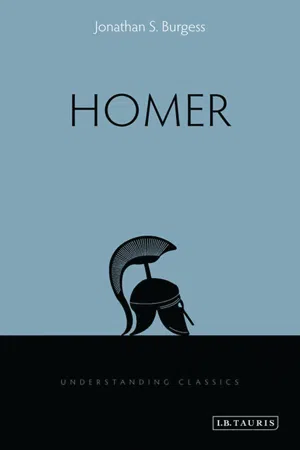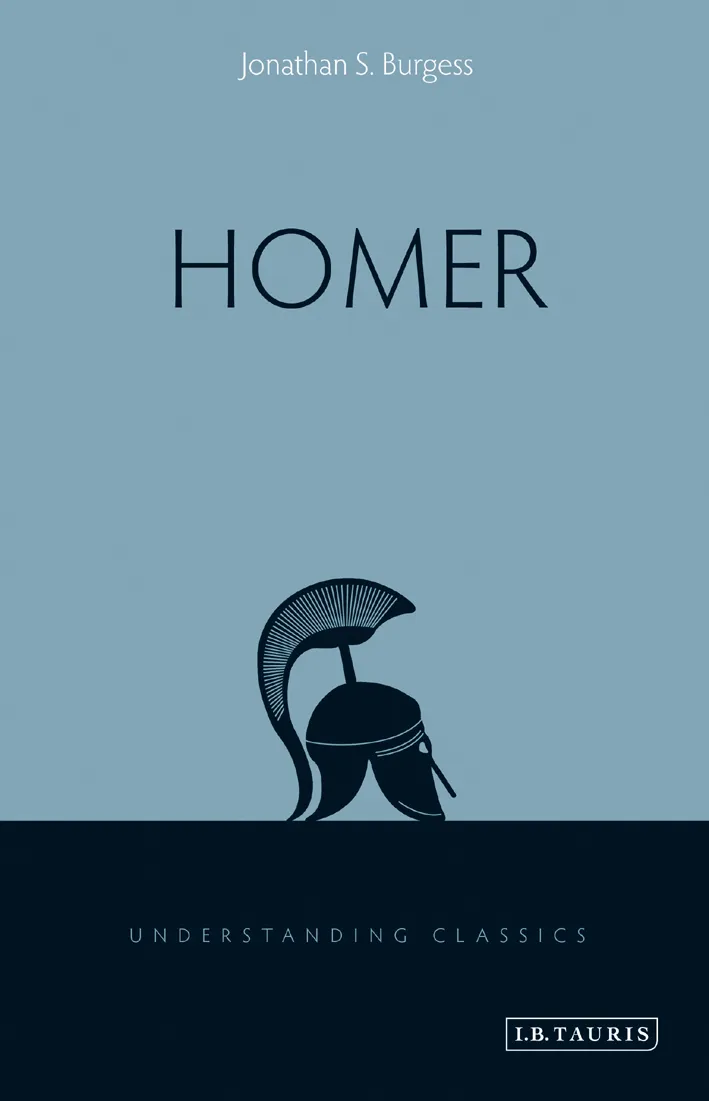What reader could fail to be enthralled by the Iliad and the Odyssey, those greatest heroic epics of antiquity? Yet the author of these immortal texts remains, in the end, an enigma. The central paradox of ‘Homer’ is that – while recognized as producing poetry of incomparable genius – even in the ancient world nobody knew who he was. As a result, the myth-maker became the subject of myth. For the satirist Lucian (c.125–c.180 CE) he was a captive Babylonian. Other traditions have Homer born in Smyrna or on the island of Chios, or portray him as a blind and wandering minstrel.
In his new and authoritative introduction, Jonathan S. Burgess addresses fundamental questions of provenance and authorship. Besides conveying why these epics have been cherished down the ages, he discusses their historical sources and the possible impact on the Iliad and Odyssey of Indo-European, Near Eastern and folktale influences. Tracing their transmission through the ancient, medieval and modern periods, the author further examines questions of theory and reception.
JONATHAN S. BURGESS is Professor of Classics at the University of Toronto. He is the author of The Tradition of the Trojan War in Homer and the Epic Cycle (2001, paperback 2004) and The Death and Afterlife of Achilles (2009).
Jonathan Burgess is a leading figure in the ongoing study of Homeric poetry. He views this dynamic art form within the historical context of its reception in the overall song culture of the ancient Greeks – as also in the literary world of the Classical and the post-Classical eras. Such a perspective, which takes all epic traditions into account, gives the reader an illuminating view of Homer as a grand unifying idea of Hellenic civilization.
—Gregory Nagy, Francis Jones Professor of Classical Greek Literature and Professor of Comparative Literature, Director of the Center for Hellenic Studies, Harvard University
Two and a half millennia of criticism and reception of the indescribably rich Homeric texts make the task of introducing them quite Herculean, but Burgess has managed it superbly. This eminently readable survey covers an enormous amount of ground with tact and insight. Deeply informed both theoretically and philologically, this is an outstanding introduction to possibly the greatest poems in the Western canon.
—Robert Fowler, Henry Overton Wills Professor of Greek, University of Bristol
Jonathan S. Burgess is one of the most important scholars working on Homer today. In this elegant new book he starts with the big picture, introducing readers to the world of ancient epic. He then narrows his purview to focus on the Iliad and the Odyssey, discussing plot, characters and transmission. Finally, he homes in on one central mystery: the identity of Homer. The learning is vast; the approach nuanced; the writing crystal-clear. Readers will delight in this book, and learn a great deal from it.
—Barbara Graziosi, Professor of Classics, Durham University
Jonathan Burgess has written an admirable introduction, covering with lucid concision all the main issues from the Indo-European origins of Homeric epic to its reception in our own time.
—Richard Seaford, Professor of Ancient Greek, University of Exeter
Understanding Classics
Editor: RICHARD STONEMAN (UNIVERSITY OF EXETER)
When the great Roman poets of the Augustan Age – Ovid, Virgil and Horace – composed their odes, love poetry and lyrical verse, could they have imagined that their works would one day form a cornerstone of Western civilization, or serve as the basis of study for generations of schoolchildren learning Latin? Could Aeschylus or Euripides have envisaged the remarkable popularity of contemporary stagings of their tragedies? The legacy and continuing resonance of Homer’s Iliad and Odyssey – Greek poetical epics written many millennia ago – again testify to the capacity of the classics to cross the divide of thousands of years and speak powerfully and relevantly to audiences quite different from those to which they were originally addressed.
Understanding Classics is a specially commissioned series which aims to introduce the outstanding authors and thinkers of antiquity to a wide audience of appreciative modern readers, whether undergraduate students of classics, literature, philosophy and ancient history or generalists interested in the classical world. Each volume – written by leading figures internationally – will examine the historical significance of the writer or writers in question; their social, political and cultural contexts; their use of language, literature and mythology; extracts from their major works; and their reception in later European literature, art, music and culture. Understanding Classics will build a library of readable, authoritative introductions offering fresh and elegant surveys of the greatest literatures, philosophies and poetries of the ancient world.
Understanding Classics
Aristophanes and Greek Comedy
JEFFREY S. RUSTEN ∙ Cornell University
Augustine
DENNIS E. TROUT ∙ Tufts University
Cicero
GESINE MANUWALD ∙ University College London
Euripides
ISABELLE TORRANCE ∙ University of Notre Dame
Eusebius
AARON P. JOHNSON ∙ Lee University, Tennessee
Homer
JONATHAN S. BURGESS ∙ University of Toronto
Latin Love Poetry
DENISE MCCOSKEY & ZARA TORLONE ∙ Miami University, Ohio
Martial
LINDSAY WATSON & PATRICIA WATSON ∙ University of Sydney
Ovid
CAROLE E. NEWLANDS ∙ University of Wisconsin, Madison
Pindar
RICHARD STONEMAN ∙ University of Exeter
Plutarch
MARK BECK ∙ University of North Carolina, Chapel Hill
The Poets of Alexandria
SUSAN A. STEPHENS ∙ Stanford University
Roman Comedy
DAVID CHRISTENSON ∙ University of Arizona
Sappho
PAGE DUBOIS ∙ University of California, Berkeley
Seneca
CHRISTOPHER STAR ∙ Middlebury College
Sophocles
STEPHEN ESPOSITO ∙ Boston University
Tacitus
VICTORIA EMMA PAGÁN ∙ University of Florida
Virgil
ALISON KEITH ∙ University of Toronto
Published in 2015 by I.B.Tauris & Co Ltd
6 Salem Road, London W2 4BU
175 Fifth Avenue, New York NY 10010
www.ibtauris.com
Distributed in the United States and Canada Exclusively by Palgrave Macmillan
175 Fifth Avenue, New York NY 10010
Copyright © 2015 Jonathan S. Burgess
The right of Jonathan S. Burgess to be identified as the author of this work has been asserted by him in accordance with the Copyright, Designs and Patents Act 1988.
All rights reserved. Except for brief quotations in a review, this book, or any part thereof, may not be reproduced, stored in or introduced into a retrieval system, or transmitted, in any form or by any means, electronic, mechanical, photocopying, recording or otherwise, without the prior written permission of the publisher.
References to websites were correct at the time of writing.
ISBN: 978 1 84885 862 6 (HB)
978 1 84885 863 3 (PB)
eISBN: 978 0 85773 514 0
A full CIP record for this book ...








